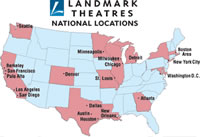It is with great interesting that we see that Marc Cuban and Todd Wagner have bought Landmark Theatres, America’s largest chain of 54 art-house cinemas which are scattered over fourteen states.
 They both came into the public eye when they sold an innovative webcasting company, broadcast.com, that they had founded in 1995, to Yahoo! in 1999 for $5.7 billion. Following that avalanche of cash, Cuban went to buy the NBA team Dallas Mavericks, found High Definition TV specialist HDNet and co-found 2929 Entertainment with Wagner.
They both came into the public eye when they sold an innovative webcasting company, broadcast.com, that they had founded in 1995, to Yahoo! in 1999 for $5.7 billion. Following that avalanche of cash, Cuban went to buy the NBA team Dallas Mavericks, found High Definition TV specialist HDNet and co-found 2929 Entertainment with Wagner.
HDNet two 24/7 networks, HDNet and HDNet Movies, produces and televises more hours of original HDTV entertainment, news and sports programming than any other network.
2929 Entertainment is a vehicle for movie production and, following its November 2001 purchase of Rysher Entertainment, holds substantial film and television programming library, including various rights to shows including “Sex and the City”. It is also currently in post-production on two films including “Godsend” staring Robert DeNiro.
The Landmark Theatres chain has been for sale since 2001, languishing as part of a Chapter 11 bankruptcy filing. The financial terms of the purchase, which is scheduled to close in October, have not been disclosed.
Why does this make an interesting deal?
Digital cinema has held promise for a long time, but has effectively stalled.
The cinema theatre owners are not willing to pay for the digital projectors, as they say the margin that the make on showing films is so slim (the reasons the cite for the necessity for popcorn sales) that they are not able to invest in the equipment. They also point out that it is the film distributors that will gain most benefit from the drastically reduced film distribution costs – physical copies of the film, at a cost of around $3000 each, do not have to be made, nor to they have to be transported to each of the cinemas.
The film distributes say it is not for them to pay for the equipment, as this is the responsibility of the theatre owners. It is also widely believed that they have very little will to digitally distribute their content, as content protection schemes haven’t been decided upon.
The excitement of d-cinema is not just about showing blockbuster films, but the ability to economically distribute small, independent film and other video content that would not normally be shown at as cinema, such as music or sporting events – enabling cinema to become something different.
Now they have the theatre chain, Wagner said they can now take movies from production to the screen with no outside interference – “We think this acquisition provides a unique opportunity to make a significant impact in the art and independent film, HDTV production and digital exhibition communities.”
Together this collection of companies not only have the content, technical savvy, strategic vision and the money to make this possible, but they are run by people who are keen to shake things up. This could be the kind of competition that the film companies need to make them sit up, stop the current stalemate and move up a gear or two in realising digital cinema. We wait with baited breath.